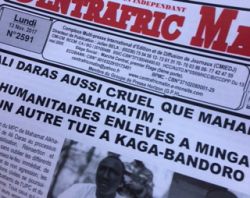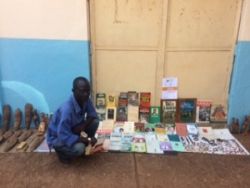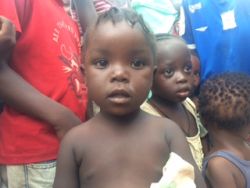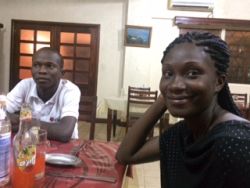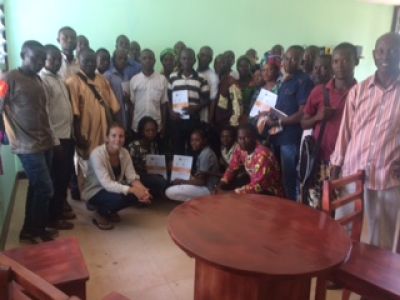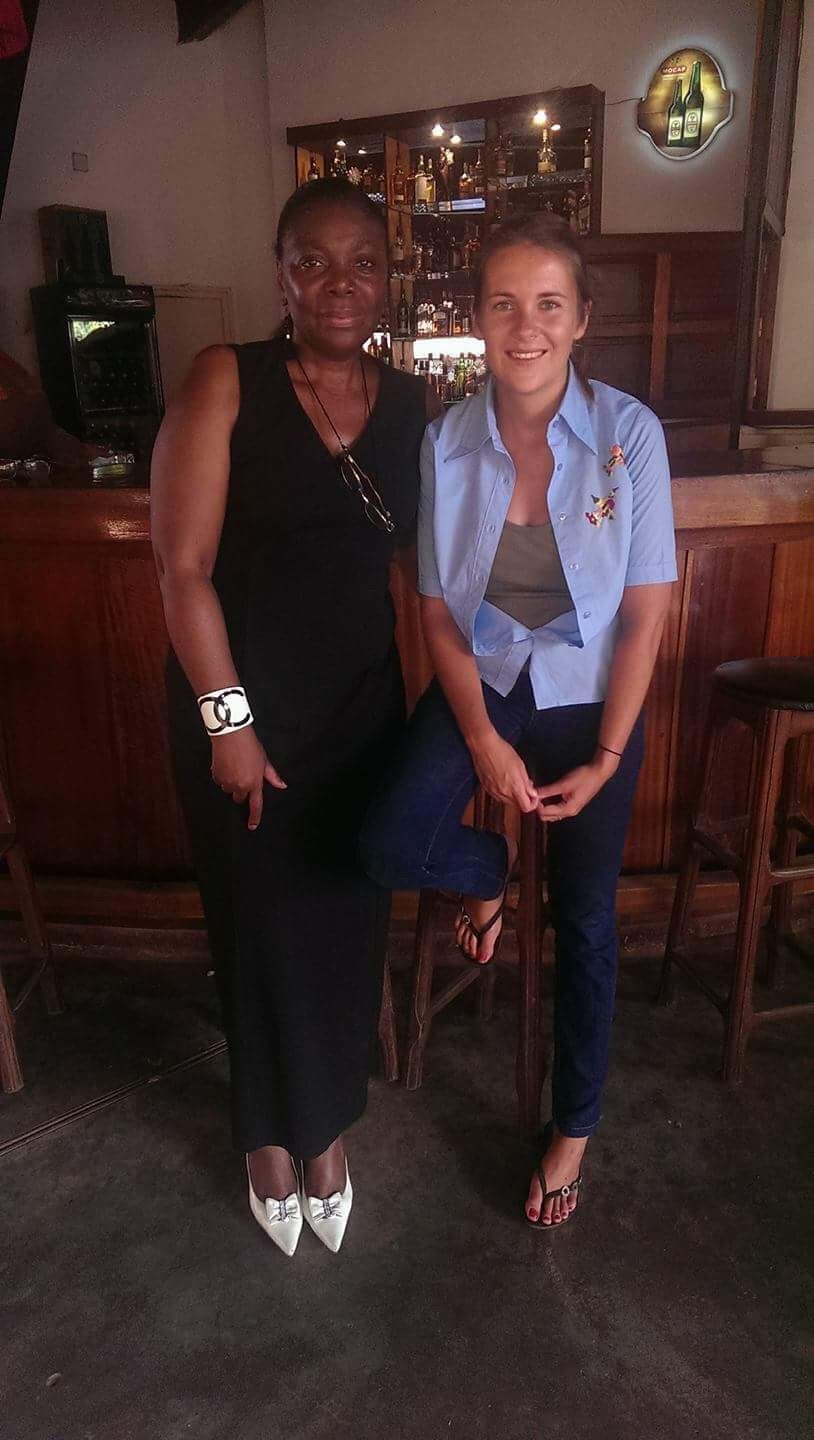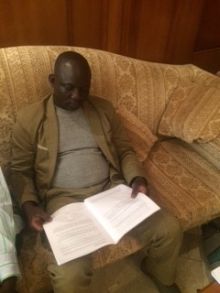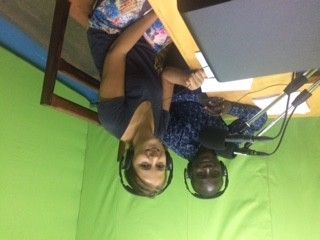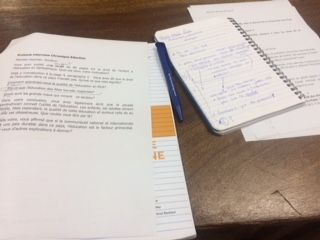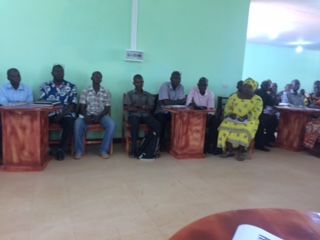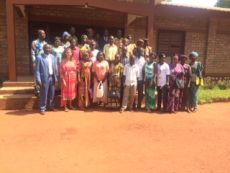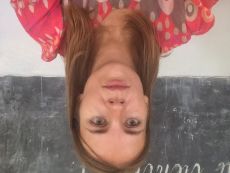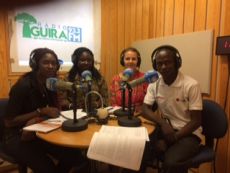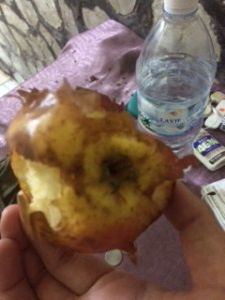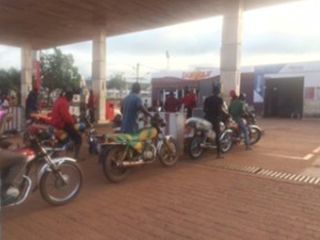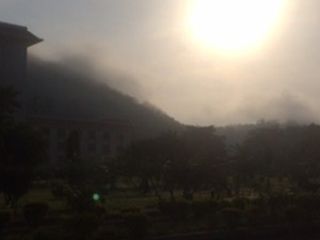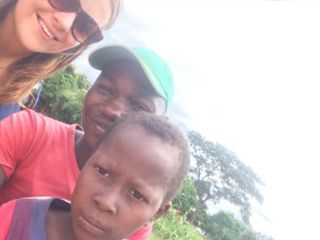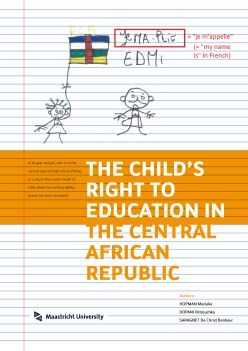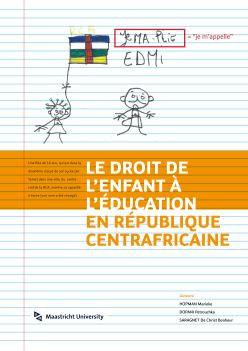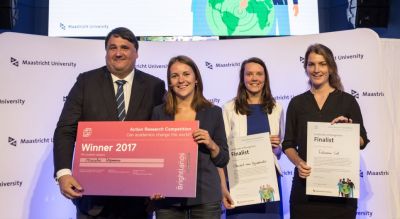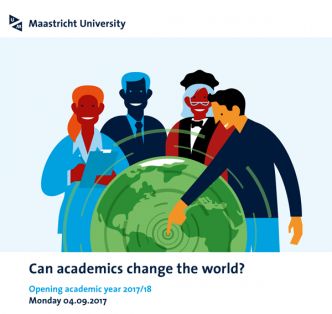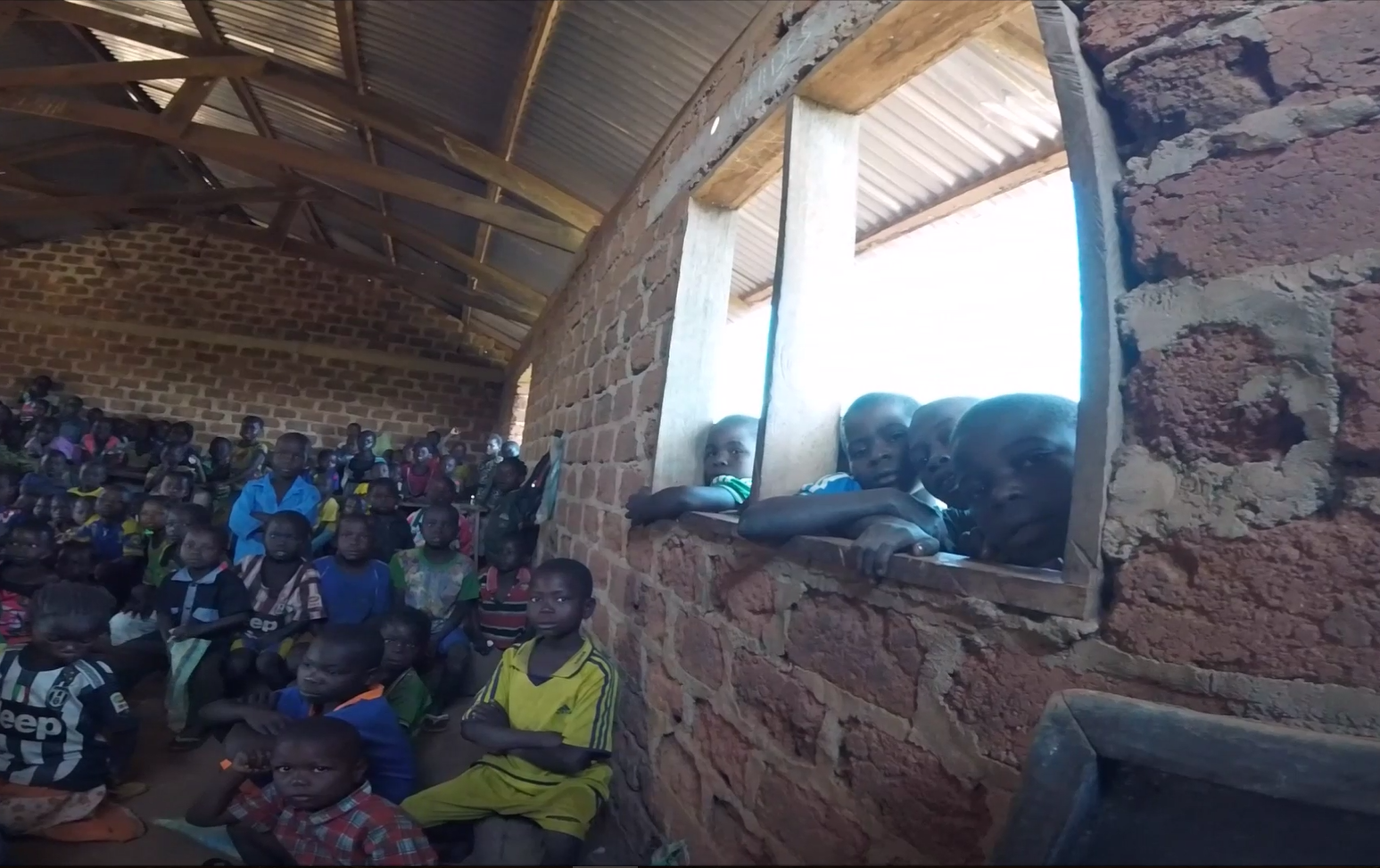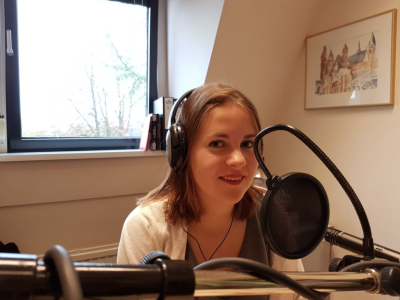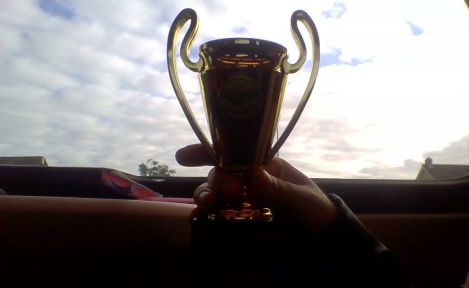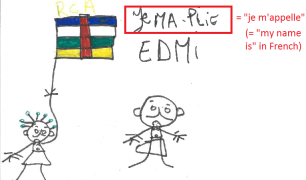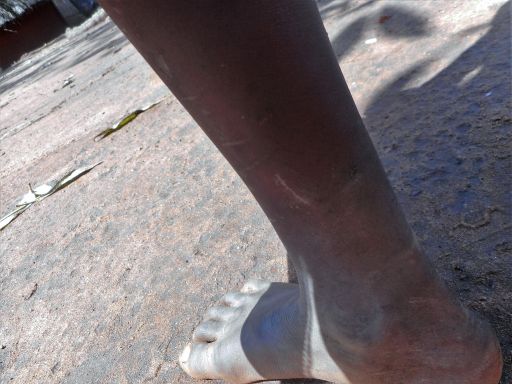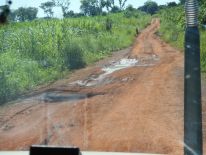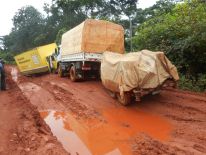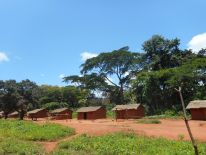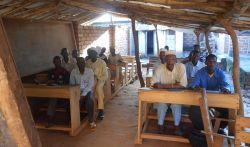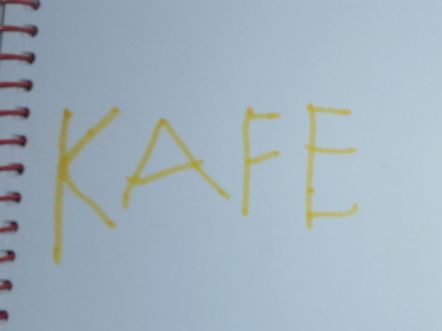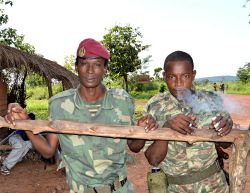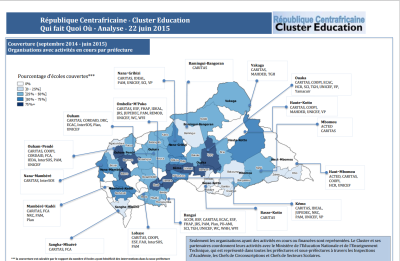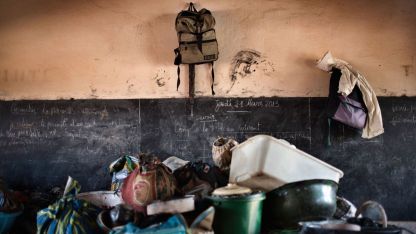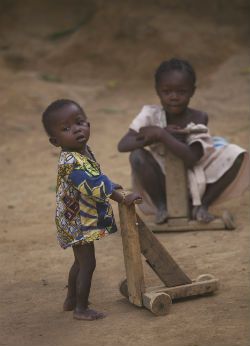Right to education in the Central African Republic
Between 2015-2017 researcher Marieke Hopman conducted a study on the child’s right to education in the Central African Republic. She stayed here for two periods of field research, and travelled back once to share the findings of the study with relevant local actors. Below you find the blogs and vlogs she created to share her experiences, from the first to the latest. Please note that some of this content is available only in Dutch.
By Marieke Hopman - 20 November 2017
After coming home from what has most likely been my last visit to the Central African Republic, at least for now, I find myself confronted with the million dollar question: three months of field research, months of desk research and writing, financial investments, personal investments (including sickness and danger) and travelling back to share the results…Has it made a difference?
On the airplane, I made a list:
- Yes, some people felt heard – at least the ones I interviewed.
- Yes, many CAR people told me, quite surprised, how good the research report was, and especially how it told the truth about education in CAR.
- Yes, the report was very popular, many wanted to have and read it (it was even easily sold). Will it make people think? Maybe? Also the radio discussions, discussions with teachers, education teachers I held…they seemed a success.
- No, I had discussions with NGO people, but did not seem able to make an impression. Only spoke to one person of the government (the minister of education turned out to be in Paris, most members of the ministry of education were on a mission somewhere). They might read the report though. But it seems in this case that the research will only make a difference bottom-up.
- Yes, there is now information available on the subject (child’s right to education in CAR) where there was none, or hardly any, before.
- No, I don’t think it will influence decision making on higher power level (NGO/government) much. Their minds are already made up, they didn’t seem to listen – as they don’t listen to the people in general. Maybe in the long term? Maybe if they can get money for a program for peace & education?
- No, tried to share these ideas of peace & education with international donors. Couldn’t even get any funding for this very small and cheap project.
- No, I don’t think people make the connection between peace and education actively. Although I tried spreading that message, if grenades are exploding, people are scared, shots are fired…the daily survival trumps long term consideration. It’s up to the wealthier, governing actors (NGOs, government, donors) to have an overview and work towards long term. However, they mostly don’t care, don’t listen, are too occupied with their selfish interests (meeting targets, self-enrichment, etc.) Plus too cynical and without hope or believe for the CAR.
- Yes, with this story and experience, I can now start addressing the international community. Make a fuss about what’s going on in CAR in international media, in Geneva and Brussels, as much as I can.
- No, I did not nearly have enough reports. Spreading more reports would help a great deal to get the dialogue going. People are so eager for information! Couldn’t/Can’t find the financial means to print more. Online publication is clearly not accessible for 99,9% of the CAR population.
- Yes, finally, someone started a public debate about corruption in schools. I’ve seen people take up the discussion among themselves, in relation to their institutions and establishments.
- No, if people want to take action based on the report, there are no means available, there is no follow-up (but perhaps this is not my responsibility as a researcher?).
The first night back in my own bed in the Netherlands, I had a nightmare. I dreamed that a large group of people, thousands and thousands of them or even more, was being attacked and eaten alive by huge animals. They were all running around, screaming and dying. I was there, and I seemed to be the only one knowing something about how to stop these animals from eating you. I tried to tell other people, to inform them what they could do. But it was impossible. First of all because they were all running around being scared, and secondly because I couldn’t figure out how to reach them all, as there were so many. The only thing I could do, it seemed, was to grab one and hold this person tight.
On bad days, I feel like what I did will get lost in the sea of well intended, but useless, efforts. At the end of the day, it is not going to make a difference. Sometimes I think: at least I tried, and that is always better than not trying at all. On good days, this is my answer:
- Yes, I have shared information and possible solutions. With the clear “assignment”: this is my contribution, my gift to you. Now it’s up to you, Centrafricains, to take up this responsibility, for your own children, for your country, for your future. I hope you will use what I have given you.
By Marieke Hopman - 16 November 2017
Monday 13 November
Started the day going to Grand Café. Wanted to try get in touch with the written press. At Grand Café, they sell CAR newspapers. Bought a few and called the numbers of journalist. The first one I spoke to about the research immediately was very enthusiastic and wanted to come see me right away. Great! However, when he arrived, I quickly understood that, in order for anything about my research to get published, I would have to pay. And so I learned that free press does not exist in CAR – in fact, all articles in all the newspapers are bought. And they cost about 70.000 CFA (€ 120) for two pages, which is an enormous amount of money, especially in CAR. And mind you, newspapers are not handed out for free either! Was very tempted for a moment, to pay anyway because I think sharing the results is so important.. but decided against it.
I also went to see the guy who sells books next to Grand Cafe. Had given him a report 2 days before, to see if he could sell it (to “test” the interest in the issue and the report of locals) – and he had! Sold it for 2000 CFA (about € 3. In comparison: a bread costs 100 CFA. So seems like it does have indeed value to local people!).
Then, my last time teaching future teachers at the university. Again great discussions, my only sorrow being not nearly having enough reports to hand out – which has been an issue all throughout this visit..!!
In the afternoon I went with my research assistant into her neighborhood to collect data, images, testimonies and chicottes for the theater play on CAR (which, by the way, will be tried out on 24-26 November in Rotterdam. You are all invited, tickets are free, but places are limited. Please email me if you’d like to come (
Tuesday 14 November
During the night I got pretty sick. So far, every visit to CAR I have been sick, which is not surprising due to the very poor hygienic circumstances compared to back home. I was very cautious this time because no time for sickness…however, it caught up with me. I was going to soldier through, because it was my last day and there was way too much left to do. Started the day going to CARITAS office but while there, could hardly sit up and also really had to be near a toilet .. so decided to go back and lie down. Postponed my meeting with an employee of the ministry of education so as to hopefully regain a little strength. At the mean time, however, someone in the PK5 neighborhood had thrown a grenade into a school which allegedly killed 3 children. This shook up the community pretty badly, which meant that a) I couldn’t get organized with the radio station Ndeke Luka to organize the radio debate about education in CAR that I wanted to organize with the cardinal, imam and former minister of education, and b) I think this engaged the employee I wanted to speak too because I could not get in touch anymore.
So I basically spent my last day lying in bed, feeling awful and frustrated and depressed and contemplating about the use of it all and whether this whole research project had made any sense at all (more about that in my next post).
Luckily, in the evening my dear friends/colleagues from CARITAS came to pick me up and take me out, even if I didn’t eat much, at least to say goodbye. I was very grateful. Also I could arrange with them to bring the last reports I’d saved, to the ministry of education, and to give the report on a USB to the conseiller technique, who will put it into a digital system he’s setting up which will most likely mean that 1-2 years from now, through the distribution of e-readers to all CAR teachers (this is his amazing project!!), ALL teachers in CAR will be able to read my report.
Wednesday 15 November
My friends from CARITAS brought me to the airport and stayed a long time to wave at me all through the check-in process. So grateful for all their help, support and love!! When I landed in Casablanca (where i had to spend the night), had several phone calls with a journalist from the radio station, to organize the debate. He also called me at 5.58AM this (thursday) morning again to discuss it. So I still have some hope that this will happen even when I’m not there. Which would be even better – because, now I’m gone and it’s up to the people of CAR themselves to take up the research, its results and solutions, and start working on improving education in their country….
By Marieke Hopman - 13 November 2017
Friday 10 November
Started my day again with teaching/discussing the research with a group of teachers and administrators. I wasn’t quite sure whether to do so many sessions with high school teachers, who are in university, as this is clearly a more privileged group compared to the rest of the country. Also most children in this country will never ever attend high school so was this really the group to spend time and energy on? However, when talking to them it turned out to actually be quite useful. It has been about 10 years (they say) during which students are educated to become teachers (even if very little), but after their studies there are no jobs for them in the public sector. Although there obviously is a great shortage of qualified teachers, the problem is that the state does not want them on a payroll. Therefore after their studies, they disappear either to teach in private education or to do other jobs. So who am I talking to? Where do they come from, and what will they do next? It’s hard to tell. They are at least people who are interested in education, and people who are relatively high educated. They might be future educators, future politicians, future activists. Seeing how lively our discussions were, I do think, and hope, that there is a use for discussing these subjects with them. A great discussion we had was about corruption in schools. A brave student stood up and said that even in their university there is a lot of corruption. What can we do about it? It will never stop if we keep teaching corruption to children, by forcing them to pay for their marks, either with money or by sexual activities.
Saturday 11 & Sunday 12 November
On Saturday I was invited by the former minister of education, Gisèle Bedan, for lunch. What an amazing woman! So passionate, energetic, courageous.. We had a great discussion about education in CAR, which lasted (without noticing) for hours. She told me about how she fought corruption especially on the level of high school exams, and how in the end she had to resign because of numerous death threats.
My plan for the afternoon was to visit my research assistant Petrouchka and to collect information and artifacts for the theater piece we are preparing in Maastricht, about education in CAR. However, my phone had stopped working. It turned out I needed to show my identification at the Telecell shop, which wasn’t open in the weekend. Bought a new sim card, which then turned out not to fit into the Iphone. Tried to use my old Nokia, but at that moment there was no electricity in the room where I was staying so I couldn’t charge it. It became dark (around 18h) and it started to rain, thunder and lightening. So as I couldn’t contact anyone, I found myself locked in in my room, with no light. Decided to go to bed early and try again the next day.
Sunday morning, Nokia did not work, tried calling people with my Dutch number. Did not work, probably because people do not have enough phone credit to pick up, as it costs them money too. Finally managed to contact a friend who proposed to pick me up so that at least I could get out of the room. I was hoping to get in touch with my assistant later and get to work. Unfortunately I only heard from her in the late afternoon. It turned out that the evening before, a grenade had exploded in the neighborhood next to her house, with two killed and several wounded. It was a sign for people to start fighting, and she said that in her neighborhood shots were fired around every 5-10 minutes. So we could not go there to do our work, also it was already getting dark.
This is also to show that a large part of my work here consists not in sharing research results but in 1) arranging practical difficulties (inc finding electricity, internet, etc) and 2) making sure not to get robbed, raped or killed. Even though I pay a lot of attention and try to be as safe as possible, over the last 1,5 week I have been attacked twice and my money got stolen out of my hotel room. Once people on the market got into the car I was in with a friend, once a guy tried to pull my backpack while I was on a motor. It seems that the atmosphere in Bangui is grim, people do not like white people at all. Dealing with this takes a lot of time and energy, which I wish I could spend on discussing the child’s right to education….!
By Marieke Hopman - 10 November 2017
Tuesday 7 November
When I arrived in the Ledger (fancy) hotel in the morning to use the internet, I had to walk around the red carpet that was laid out because, apparently, the president was there with about every minister, ambassador, consultant and other authority that matters even a little bit. They were gathered for a conference organized by the United States, something on how they battled corruption in Seattle and how this could be used as a model for CAR (which seems doubtful to me seeing the extremely different contexts,and then think about the fact that for this conference the complete governance of the country was stopped for 2 days as everyone of any position was at the event…). Anyway, what a chance! Went there to talk to people and met all kinds of high placed officials who were all very interested in my research. And I mean VERY interested. I did not have enough copies of the research report but people sat down just to read it on the spot, and actually started truly reading it rather than scanning.
Tried getting in touch with the president to discuss the subject or at least give him a copy. Many people were mobilized to help me do so and we got to the chief of staff, but at the end of the day it seemed to come down to the fact that he wasn’t interested.
In the afternoon I visited the national radio Ndeke Luka for the second time, as I was invited by a journalist. When I came in I found out that apparently we were recording an interview right away. i tried to quickly take some notes and prepare a story (if you have 15mins to talk to the CAR people about this subject, what do you say?? – Yes you can imagine I was pretty tense about it). Then when we had our headphones on, technician in place etc, first thing the guy asks me is whether I have a boyfriend and if I’d be willing to marry him. Thank god that after that uncomfortable interval we had a normal, quite good interview (I think). It was my first time in French so that scared me a little – what if I don’t understand the question the journalist asks? – but it was fine. I spoke mostly about how we should change the education system to be more peaceful and to raise children in a spirit of peace rather than corruption and violence.
In the evening I met with an employee of an i nternational NGO, who works on education in CAR on a high level. I was really eager to talk to him and share the research results, but at the end of the day it seemed like there was not much I could share with him because he felt too restrained by the system of his organization to actually change anything. Most things that are going wrong when it comes to international intervention on education in CAR, seems to be the result of a failing (international) humanitarian aid structure – at least, according to this person.
Wednesday 8 November
Started my day meeting with a group of education inspectors at the Ecole Normale Superieure (ENS). I was again quite nervous because it was my first time “teaching” and discussing with local people in such a setting. These are people who work in education all through the country, their job is mostly to write reports about the state of education for government. This gathering was GREAT. I spoke about the importance of their work, the importance of sharing true information in their reports, of whom to share this information with, and of how to help the teachers and children in the schools they visit. I recommended talking to children to get true information and spoke about the importance of ethics and anonymity. Afterwards during the discussion so many people contributed, sharing thoughts and issues and frustrations. It was clear (what a relief) that my research was of great use to them, especially the discussion we were having. One thing that really struck me was, when I spoke about adapting the education system to CAR reality/context to make it more relevant (including teaching in Sango) a guy stood up and more or less shouted into the room “She is right! Look at us! We are not proud of our country! Imagine, we need a WHITE GIRL to ask us why we are not teaching our children in our own language?!”
Thursday 9 November
Started my day teaching and discussing education in CAR with primary school teachers, and their teachers, at the Centre Pedagogique (CPR). Again a very different target group, as they are the people actually standing in the classroom. And again it was GREAT. We had some really good and open discussions about the use of violence in the classroom, and discussed possible alternatives to keep order (such as alternative punishments and positive enforcement). The teachers were very attentive, writing down all practical things we discussed and asking many questions. Another thing we discussed was practical things they could do to make their math a nd language lessons more interesting and relevant. For example instead of “50-25″ why not say “I go to the market with 50 CFA and I want to buy an orange of 25 CFA. How much do I have left after?”.
After teaching we quikly left for radio Guira, the CAR radio station managed and paid for by the UN mission (MINUSCA). Here we did a 45min interview, of me together with my two research assistants Bonheur and Petrouchka. This was great also because in this way, we were able to do the interview in both French and Sango. What was difficult however was the journalist asking me whether or not to use the chicotte (whip) in the classroom. She clearly thought it was not violent at all. I don’t want to be the white girl who says: don’t use the chicotte, because then people will not take me seriously. But I don’t want to say “use the chicotte” either…so what to do? I ended up saying that the people in CAR in my opinion, need to consider the relation between violence in the classrooms and their wish to have peace in the country, and I referred to the chicotte historically being an instrument used by the colonizers on black slaves…
At the end of the day I met with someone from the World Bank working on education in CAR. Had a little time to tell her about my research findings and give her the report, hoping it will make a difference. Also shared my critique of their latest plan for “creating peace in CAR”, which focuses too much on quick results through quantitative and practical means, rather than a more profound change. How would you create peace in a country that has not known peace for at least 25 years..?
By Marieke Hopman - 7 November 2017
Dear all,
Here’s a quick overview of what has happened the first days of my mission to share the research results and try to do something positive for the child’s right to education in the Central African Republic.
Saturday and Sunday 4 & 5 November
Arrived in the morning and was greeted by my research assistant Petrouchka. After we left the suitcases full of research reports in the hotel room, we first went shopping for clothes (for which I’d had no space in the overfull suitcases). Other things to do were to set up internet and phone connection, and get in touch with different people I know in Bangui. When in the evening I returned to the hotel, I found the apple I left on the table eaten and even my container with vitamin pills attacked. It turned out the room was full of rats. I decided to accept this fact for at least one night (even though the floor was filled with rat excrement and urine,). However, at 4 AM I woke up because one of the rats had entered my bed and started eating my hand. So I decided to move out. The next day I discovered that in my hurry and shock of leaving the room, I’d left behind the money I’d taken (because there used to be no ATMs in CAR), which I’d hidden in the room. I went back and….it was stolen.
Monday 6 november
Finally a work day – time to get going! Got up extra early to start working early. But of course things are not as quick in CAR as one would wish – so my moto taxi driver turned out to run out of gas so we had to walk to the gas station and wait in line… Finally got to start at 7AM. Content of the day:
- Visit conseiller mr. Villecroix (employee of the ministry of Education). He helped me set up many other meetings, really helpful!
- Visited two schools for becoming-teachers and education inspectors.Met with directors and set up presentations / discussions for their students.
- Visit the Imam to give him the report and establish contact and make plans for cooperation on the sharing of the results.
- Visit the national radio station Ndeke Luka to see if we can make radio emission about the research. They were very interested and we made some great plans!
- Spoke to another journalist for international media
- While moving from meeting to meeting, got completely soaked by the rain :( (on the moto we couldn’t find the house of the Imam so this kid jumped on to show us the way)
By Marieke Hopman - 6 November 2017
Bonjour à tous (English below)!
Svp trouvez en-dessous le report de la recherche sur le droit de l’enfant à l’éducation en République centrafricaine. Si vous cliquez sur l’image a côte droit le report s’ouvre. Si vous avez des questions, ou si vous voulez discuter sur le sujet, svp envoyez-vous une message à
Dear all,
Please find below the popular scientific report of my research on the child’s right to education in the Central African Republic. English version on the left, French version on the right (click the image)! If anyone has any questions, please get in touch at
By Marieke Hopman - 5 September 2017
Dear all,
Some good news: yesterday, during Maastricht University’s opening of the Academic Year, I won the Action Research Competition!!! This means I get € 3.000, which enables me to go back to the Central African Republic to share the research results. My wish is to start a national dialogue on what we can do to improve education in the CAR, together with the CAR minister of education.
You can see the video of the winning pitch below!
By Marieke Hopman - 3 August 2017
Dear all,
After my last blog 2 days ago about my dilemma surrounding the publication of my research report on the right to education in the CAR, I got so many replies!! Thank you all so much for all your emails and suggestions. Once again it can be so great to find that there are people who do care, and that I am not at all alone in my mission to help these kids. So thank you.
Today I had a really good meeting with the media&communication experts of Maastricht University. They advised me – and I would never have thought of this myself – to first go back to the CAR and take a small first step with implementing the research results, which is to start up a dialogue on education based on my research findings. Then after I can come back and (hopefully) share a story of “change is possible, and this is the first step, based on this research report” with the media, instead of a cliche story of “look at these poor children in Africa”.
So, I contacted both the CAR minister of education and his adviser to see if they are still interested in cooperation, and if indeed they can provide me with a visa and a place to stay. They said yes, and so I booked my ticket: flying out 4th of November. This time I will stay in Bangui only, and only for a short time – but it will be a first step, and after I think it will be up to other people to carry on with the project, using the research data and working for a longer period in CAR to continue this change. As should be the role of the researcher (or, in the words of my wise and caring father, in reply to my blog: “I think you overstretch your responsibility here … you are not GOD himself”).
On the practical side, this means that I still have to find funding for translation, travelling back and, if possible, graphic design of the report. To find this funding I received some good ideas from some of you, which I will pursue over the coming period. And I’ll definitely do what I can to win the university’s competition…3000 euros, fingers crossed!! I will also need to bring printed copies to CAR, but I guess I will simply use the university printers, put the report in cheap folders and fill up my suitcase with these home printed copies.
Thanks again for all your input and advises, I will definitely keep you up to date!!
By Marieke Hopman - 1 August 2017
Dear all,
I am coming to the end of my case study on the child’s right to education in the Central African Republic, and slowly starting on the last case study in the Turkish Republic of Northern Cyprus. Of course part of my efforts are directed to trying to make as much of a difference for CAR children as possible based on my research results.
To this purpose, I have written a research report on the case study which includes advise for different actors involved such as NGOs, politicians but also teachers. Together with the CAR minister of education I wrote a plan on how we could use the research data to really make a change in the CAR – a plan that involved organizing a national dialogue on the national radio and in different villages, translating the research report into Sango and printing and distributing the report. However, by now I have approached quite a few different actors (NGOs, political actors) with this plan and so far it seems that no one is willing to finance and/or execute it.
Today I got a phone call from a journalist – I have been getting quite a few of those; the media seems to be very interested in the report. I have been holding them back, telling them to wait for the publication of the report. However, today this journalist told me that if I don’t publish soon, the media will have no more interest because it will have been too long since I was in the CAR.
So here’s the dilemma, currently I do not have the money to:
- pay for the graphic design of the book (which I think is crucial for anyone to read the report) (costs about € 3.500)
- pay for the printing of the report (costs at least € 5.000 – 7.000)
- pay for being able to go back to the CAR and present the research results so that it can actually have an impact in the country (costs at least € 2.000)
- pay for the translation of the report from English to French (costs € 600)
I signed up for a call for action research of Maastricht University, to win € 3000 to be able to help the children in the CAR, but I will only hear at the end of August whether I have even been selected to compete for the prize in September. Another crowdfunding is not feasible at this point either, since my students are already preparing a crowdfunding for the Cyprus case which also still needs funding.
So what to do??
- Wait until I find a sponsor for this part of the project and give up on (at least part of) media attention for the research
- Publish the report online early September, and reach out to media, with or without graphic design, or even print it – I could cover these costs from my research budget at the Maastricht University Children’s Rights Research Fund, and hope for the best in trying to get to the end of the PhD without serious financial shortage
- Do I go back to CAR to share the research results or not?? I feel that if I don’t, in a way, it feels like it has all been for nothing. I do not think that international attention for the case will really change anything for CAR children.
So if anyone has a great idea about what to do, or a very rich uncle who is looking for a great purpose for about € 10.000 – €15.000 (all reported on and controlled by the independent Maastricht University Children’s Rights Research Fund), please share!!!
By Marieke Hopman - 15 May 2017
Dear all,
Just a short message to let you know, and invite you to, an event where I will be speaking on the 1st of June. The event is titled "Being young in times of conflict: Readings from the Central African Republic". As the organizers write: "While rebel-leaders and combatant- voices tend to reach our media sources, the voices of ‘ordinary’ young people have difficulty being heard both within the country and abroad".
In addition, today the children's rights index 2017 has come out today. This index ranks how countries adhere to and are equipped to improve children's rights. CAR has been ranked LAST IN THE WHOLE WORLD.
So, even more reason to take an interest in the young people of this country!! You can read about, and register for the event here.
By Marieke Hopman - 29 January 2017
MH: But what if they would just teach half a day a month?
Resp: That would be good, but it is not possible. They have to go fishing. If they don’t go, how will they feed their children?
MH: I have trouble believing that teaching for only 4 hours a week will make the difference between eating and not eating.
Resp: I cannot command them. If they don’t want to, can you force them?
MH: You are the chief, do you not have that power?
Resp: I have power, but I cannot force people.
MH: So what kind of power do you have in relation to education?
Resp: If I command someone, who wants to go fishing, to teach and to force them to teach?
MH: I am just curious to see how it works in the village, the relation of power, authority and autonomy…
Resp: Before, the young people were receiving the village chief. Nowadays, after the arrival of human rights [a relatively new concept in the village, apparently], if you ask them to do something, they don’t accept it. When they don’t accept it, you have no right to take it by force.
By Marieke Hopman - 2 February 2017
Ata (13) has been out of school since age 11.
MH: Why did you stop school?
Ata: it was a problem of [financial] means.
MH: What was the problem?
Ata: My parents did not want to support me and me myself I did not have the possibility to earn money to buy school supplies.
MH: Why do you think your parents do not want to support you?
Resp: I will try my best to get back into school this year.
MH: How?
Resp: I pray to God and maybe He can help me and give me some money, that could help me to buy notebooks and pens, to go to school.
One of the most important reasons why children are not in school is because they cannot afford the school fees, including the money needed to buy pens, notebooks, a backpack, clean clothes, soap…It seems in that case “the right to education” does not mean much. Who is supposed to pay for school? The parents – but they often have many children and cannot afford to send them all to school…The government? The NGOs? Children themselves? God?
By Marieke Hopman - 21 November 2016
Vlog ten of my second trip to the CAR. The vlog shares experiences on days 41 to 47. It includes a trip to the village of Obo. Images of local classrooms, me trying to adjust to local customs, and saying goodbye.
By Marieke Hopman - 21 November 2016
Vlog nine of my second trip to the CAR. The vlog shares experiences on days 35 to 39. How can you find out the truth about some of reasons why education is not always function in the CAR? Do parents have to pay to school or not?
By Marieke Hopman - 21 November 2016
Vlog eight of my second trip to the CAR. The vlog shares experiences on days 26 to 33. Meeting with the Cardinal and the Imam, and more impact work, and getting attacked.
By Marieke Hopman - 21 November 2016
Vlog seven of my second trip to the CAR. The vlog shares experiences on days 23 to 25. Travelling back to the capital Bangui, meeting with the education minister, getting very excited about possible impact of the research…and some party, celebrating social cohesion and peace!
By Marieke Hopman - 21 November 2016
Vlog six of my second trip to the CAR. The vlog shares experiences on days 20 to 21, the second part of my trip to the city of Bouar. It shows some images from inside the classrooms, including corporal punishment. Why does it occur? And should this be changed?
By Marieke Hopman - 21 November 2016
Vlog five of my second trip to the CAR. The vlog shares experiences on days 15 to 16, about the start of my trip to the city of Bouar, and into the remote areas together with NGO CARITAS. Why are the CAR schoolbooks in French? And how happy is the local population to receive these textbooks?
By Marieke Hopman - 28 December 2016
Dear all,
Since two days I am again back in the Netherlands, and even on the plane I started working on processing the results. There is so much information, so many impressions, and I am hoping to have a report and a PhD chapter finished in two months..!
Today I wanted to make the last video journal but I cannot really get myself to watch the images just now. It is my second time coming back from CAR and it is not necessarily easier. I guess when you are in the middle of it, you kind of absorb and postpone all emotional reactions. Then when coming back, it kind of hits you in the face. Which is normal and good, but, I just need a minute :). So the video is coming up soon, but not just now. In the meantime I just wrote a poem – it’s not a very good one, but I think it explains very well what it’s like coming back, and what reality in CAR is like. For now, it is all I can do not to get back on the next plane to Bangui…
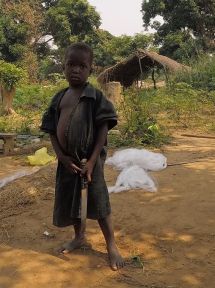
It is usually around 4PM
I’m studying, I’m reading,
I’m listening, I’m understanding
taking a nice, analytical
distance
Until at 4PM
it hits me
reality
I go out for a cigarette
my stomach starts hurting
I go to the toilet
I sit, I shit,
I lost
again
Reality sweeps me off my feet
turns my head upside down,
saying
Remember what you did?
Remember whom you talked to?
Remember you did not go back
to see if they were still
alive?
Remember the one trustworthy
government official
with his crooked reading glasses
who told you everything
who got killed?
Remember the girls?
Remember those you left
behind, who are waiting,
hoping, praying, while
things are getting worse?
What are you doing,
sitting on a sofa, reading
a book?
When do you go back
to die with them?
What gives you the right
to leave?
I know I don’t have a right to anything. I don’t
need to take this warm shower, wear
these warm clothes, glasses, wine, throwing
away the food that we did not finish,
using lamps,
heating the whole house,
playing violin.
But I don’t know what
else to do.
By Marieke Hopman - 21 November 2016
By Marieke Hopman - 17 November 2016
By Marieke Hopman - 13 November 2016
By Marieke Hopman - 8 November 2016
On 4 November I travelled back to the CAR for a second period of field research. This video presents the first four days of this trip, from saying goodbye to my parents, learning about recent developments in the conflict, to interviews at a school and some nice singing by a local girl.
By Marieke Hopman - 27 October 2016
Goedemorgen! Vanmorgen mocht ik live op radio 1 praten over de eerste resultaten van mijn onderzoek. Waarom wordt het recht van kinderen op onderwijs geschonden in de CAR? Zij hebben geen toegang tot onderwijs bv omdat er in de straat wordt geschoten. Als ze dan wel naar school kunnen gaan is de kwaliteit van het onderwijs zo slecht dat ze als nog weinig leren, en tot slot leren ze met name overleven in een extreem gewelddadige omgeving - zelfs in de klas.
Je kunt hier meer informatie over het interview terugvinden.
By Marieke Hopman - 6 October 2016
Yesterday I participated in a “science slam” during the Night University Festival at Tilburg University. Four researchers had to present their research in 10min, in a way that would move the audience. It was my first time to talk about the first preliminary results of the CAR field research, and also the first time to experiment with alternative ways of presenting research (in this case, I chose a slightly theatrical form reading entries from my field research notebook, connecting to the festival’s theme “face your fears”). And then the audience got to vote and…I won!! :D
For the coming period I will experiment more with alternative ways of presenting research, ways that appeal to a broader audience, but (hopefully) still find a sufficient level of depth in communication of research results.
By Marieke Hopman - 4 October 2016
By Marieke Hopman - 28 September 2016
A summarizing transcript of CAR president Touadera’s speech and the subsequent discussion at Brookings Institute. You can find the complete video on the right.
Intro, by Steven J Bennett: ‘the situation is not that bad’. Subject: a donor conference coming up. ‘we can be glad that the president Touadera has come to power with a great deal of legitimacy’.
Touadera (translated): I would like to talk about the developments in my country. Thanks ‘president Obama and the American people, our friends’. ‘the CAR is grateful for the personal involvement of his excellency president Barack Obama, involvement in our stabilization and in our peacemaking during the crisis’.
‘our history has always been marked by crisis’. ‘of all those crises, the one in 2012 and the one in 2013 were the most bloody. Religion was used for violence between Muslims and Christians and this crisis was marked by violations of human rights, the destruction and looting of public and private property and the destruction of the economic fabric and this brought about a humanitarian crisis without president. This crisis lasted 3 years and really it made the state of CAR fail. This caused disunity in the country and broke the fabric of the country.’ ‘the destruction of the state’. Thanks int. community help ‘to rebuild national cohesion’. Government, people etc have demonstrated willingness to close this dark period by ‘holding presidential elections that were free, democratic and peaceful across the country’. ‘this is one of the best exits from conflict’. ‘I committed myself, once in office, to build a country of peace, of security, a country that’s concerned with the search of cohesion and justice…where corruption would be the main enemy of the government…in summary, I have committed myself to building rule of law in my country’.
- Minister, Nat assembly is working now, started restructuring armed forces – ‘so that we can have a democratic and inclusive military’. I also committed myself to sustainable peace and started a dialogue with the armed groups, started a DDR and security sector reform.
National reconciliation: have set up commission of truth and reconciliation. ‘The government has set up a court system that has become functional all over the country so that justice can be rendered effectively and close to the citizens. And government authority is functional all over the country with help of the international community’.
Economy: cleaning up funds, clearing up customs, auditing systems for corporations, launch development of sectors such as mining, agriculture. Improvement of business climate (one of my priorities) . launch reforms to improve investments. And a job creating private sector.
Refers to help of the US, LRA (evil, people who are causing violence) – shows that the situation is fragile. ‘we need the input of everybody for social cohesion’.
‘Coming here, we come to get strength from you…but also to convey a message, a message of hope…You [institute or US] have demonstrated that democracy can be strengthened, security can be strengthened, and that opportunities can be found here in the US…So we come here to also strengthen our economical, social and political cooperation with the US. We want the lifting of embargo on weapons. Embargo imposed on the CAR and we want to train our military so that they can start their mission [..] on the integrity of the territory and the people and of property. We also brought a message of hope and friendship, because the CAR has some assets for sustainable development. Indeed, we have a geology, a hydrography climate, agricultural potential, forestry potential … we are in the heart of Africa … this country is tremendously rich in natural resources, but that are not well developed, or not well enough. We have tremendous mining resources according to the world bank …we have 470 mining sites and a partial lifting of the Kimberley process would open that industry. We have iron, copper, gold, diamond, …4 petroleum sites…between 1 and 5 billion barrels that have not been exploited yet…[sums up agricultural potential, cettle, tourism, hunting, energy production, etc]…in addition to this post-conflict situation…’
‘We’ve had different forms of aid and this has brought back peace and constitutional legitimacy’ ‘but…the situation needs some support, support on the part of the international community. That’s why the CAR is closing this dark chapter of crisis. We have come back to constitutional order, we have a national assembly that is fulfilling its role, we have a government made up of technocrats, representing the various political forces of the country, civil society and all the regions of the country. CAR is on the right track…’
- Conference of donors nov 17 2016 in Brussels
[end of speech]
[Discussion]
Q: We are all Central Africans…I’d like you to try to bring us into the mindset of a citizen of CAR who lives not in Bangui, on the border perhaps of South-Sudan or Birao, the border with Chad, perhaps describe what this person has experienced. How did this person experience the crisis that you mentioned? And with the efforts of the community, the church…how did such a person overcome this situation and survive? And how were certain services continued to be provided? Mr president, from Bangui, how are you going to strengthen dialogue with citzens in the CAR who are so far from the capital? how do you support their efforts and their endavours?
A: ‘one of our main priorities…we really want to focus on national reconciliation…that al CAR can regain social unity…one of the measures we have taken is to go out and meet these communities…we’ve been to Boar and had discussions with these citizens…Kaga Bandoro…people live in very difficult conditions, there are still armed groups in these areas…Bria…we met all of the leaders of the armed groups that have set up in that sector…in some ways it is a taking the pulse of the population, to understand what their needs are…Sibut…we are going to continue this, to stay in contact with the communities…Obo…the LRA has been threatening the population in that area [thanks US]…
Q: In Brussels on nov 17, there will be an international donor’s conference. In Brussels, how are you going to achieve this balance between aspirations of the CAR people and the ideas/initiatives of the donor countries?
A: ‘Brussels will be a key moment in our countries’ program. As you know we are exciting a crisis…this destroyed the fabric of our country…’ the CAR people are committed to leaving this situation of insecurity, despite its challenges, they voted. ‘The population wants to live side by side’. We will present priority projects. We are going to invite our partners to support us.
Q: regional integration. You have 6 neighboring countries. How are you going to strengthen regional integration? EMCCA?
A: aspiration of the CAR is to live side by side with our neighbors ‘and we have good relations with all our neighbors’. We are part of a community. [talks about refugees that have been welcomed by neighboring countries] ‘this certainly testifies to the harmonious existence we have with our neighboring countries’. MINUSCA: provide security and civil protection in the CAR.
Q: Were you able to resists the temption of visiting maths department?
A: I would have liked…I do continue to give a few classes…
Q: ‘Mr. president was one of my professors and it’s thanks to him that I learned differential equations. He’s a very demanding, but very fair teacher. Mr. president, I’d like to address national reconciliation. In a family, when brothers argue, when they fight, this means that there is an unequal distribution of resources or it can be caused by the fact that the share of the pie is so small that everybody’s fighting for the same share of the pie. So in the context of the CAR, …I realized that there are not really inequalities in terms of the regions, there are no poor and wealthy regions…there are no extremely wealthy Central Africans, there are no extremely poor…therefore this issue of reconciliation..it is not by organizing discussions that we are going to resolve the issue, but I think rather by making the share of the pie much larger…’ Q: regarding national reconciliation, a process ‘in your opinion, how important is justice and the lack of, impunity, in this process?’
Mod: 2 other questions
Q: I work with American NGO…[wants 5min with president to discuss project]
Q: Will you be welcoming American Peace Corps volunteers in your country?
A: respond to last one: [praises peace corps] my wish is to welcome the peace corps to the CAR…As an educator, I have worked with the peace corps, I have been in the field…I continue to pressure the US ambassador so that we can implement a peace corps mission in the CAR…for the time being we do not have yet..perhaps we are not legible…
First question, regarding the role of justice: peace is the main priority. First and foremost about the DDR. ‘much of our territory is currently occupied by armed groups. Some of them have decided to lay down their arms …secondly, thanks to this crisis, we no longer have a defense force, a national armed forces. We need to rebuild the armed forces, which is a very important aspect of any nation state…the crisis, in an artificial manner, had communities turn against each others…some thought it was a religious crisis, which it was not…’ ‘It is my believe that in order to achieve reconciliation, we need to recognize the rights of the victims. We need to acknowledge that they have lost much. And in order to do this, we can only turn to justice. Justice will be the cement that holds this reconciliation together…[at forum 2015] everybody said that they wanted to have zero impunity, and that is what we are currently working on. We are working with the government in order to strengthen our legal system, so we can have an independent judicial system with trustworthy people who can truly implement law. This justice is not just something for the people. We are asking partners to assist us…This is extremely important, this notion of justice. We wish to build a state of law, that is based on the rule of law. And the population has clearly stated that…I am endavouring to build a state based on the rule of law. A state in which democracy, freedom are applicable to all.
Q: I work with African diaspora, I come from Burundi. 2 Qs: 1. What is the role of the African diaspora in your projects?; 2. In terms of constitution of your country, I’ve heard there is something about your terms. You don’t want to be glued to the presidential seat forever.
Q: with committee for free and … ‘I would like to salute you for demonstrating that the rule of law, good governance and stability can take place in Africa. As you know, the president of equatorial Guinea is Africa’s longest sitting dictator’. What would you do to urge African dictators to leave because they’ve overstayed their welcome? What would you recommend that we do to bring democracy?
Q: from DRC – you inherited a challenging situation. Why did you not think about an emergency 3 year plan to stimulate the economy…don’t you think you are going to suffer from a lack of coordination?
A: last question: the Brussels conference is predicated on a 3 year strategy. The diaspora can be a source of funding for development. In my gvmt there’s a ministry that handles this particular sector – foreign ministry.
Other question: ‘we have a constitution. You know that the constitution went into effect the day I was sworn in. My mission is to uphold that constitution, this fundamental law of the country and this is the vision of the central African people and I think that this was clearly expressed’. ‘So be reassured on that particular question, we will uphold the constitution. You know that every nation has its vision and we do respect the will of each nation’s constitution…’
[end]
By Marieke Hopman - 12 September 2016
Dear all,
A few days ago I came back to Europe after the first 6 weeks of field research in the Central African Republic. As I am trying to make sense of what I saw, the stories I heard, trying to fit it into some academic theoretical frame .. I find my mind filled mostly with the children I met, the stories they told me, the desperate, seemingly hopeless situations they find themselves in. I want to write something smart and academic but find myself reflecting on a more sensitive level as well, in particular musing over the lack of love in these children’s lives. How can a country ever move forward, if its children are the subject of physical and psychological abuse on a daily basis, adults treating them like they are no more than objects or slaves?
There is a very interesting academic analysis to be distilled here that I think, or hope, will have an impact on the lives of these children, through hopefully influencing government and NGO work on education. However, for now there are two things mostly on my mind; one is, I have to go back, collect more data, finding the pieces of the puzzle that are still missing. So some of my time for the next two months will be spent on finding financial means to go back. Secondly, on the sensitive side of understanding, I find that Benjamin Clementine’s reprisal of Jimmy Hendrix’ “Voodoo Child” expresses the situation of CAR children better than I ever could; the chaos, fear, insecurity, loneliness…
Don’t wanna think about two times ten plus seven
Oh, this is getting too damn scary
Lord, hope I’m not a voodoo child […]
Standing by in the middle of the road
watching passers by as we go by
and still I’m on front, no I’m on front
as the cops, they come by
So I’m a voodoo child, I’m a voodoo child
Lord knows I’m a voodoo child […]
I’m sorry for taking your sweet time
I’ll give it back to you one of these days
if you don’t meet me now, meet me
when I say goodbye to you
don’t meet me the next world war
I hope you meet me the next one after that
You know, I’m a voodoo chid, I’m a voodoo child
And lord knows I’m a voodoo child
By Marieke Hopman - 27 August 2016
Max (8): “It is important to study. Sometimes in the morning, my grandmother tells me I have to work in the field. When I tell her I want to go to school, she hits me with a “switch”. Of the scars on my legs, some are from those branches, some are from when I play and I fall. Often I get up early when it is still dark, before everyone else wakes up. I brush my teeth and go to school.”
Children in the Central African Republic often attend school irregularly, or don’t go at all. Most of the population does not know how to read a simple sentence. One of my most important research questions is why for these children their right to education is being violated.
Until now, I find that most children like to learn, and prefer to go to school. However there are many factors that influence their situation. Max’s story is typical. I was very impressed by this boy; such autonomy and willpower! This, also, seems typical for children in the CAR.
By Marieke Hopman - 23 August 2016
On tuesday 15th August we were supposed to leave for Bambari at 16.00. Unfortunately there were some problems at the bank (they had no cash), and it got later and later …
In the end we left after 18.00 and had to drive to Sibut in the dark, which felt a bit unsafe. Driving in the dark, knowing there might be armed groups around ready to attack and loot the car, you start looking at the road differently. You find yourself watching the hands of people on the side of the road; are they carrying guns? Do they wear amulets (which they believe protects them from bullets)? Fortunately, other than that we killed a pig that was crossing the road, nothing happened.
The next day departure for Bambari at 5.30. The road was again very beautiful, and very bumpy. We stopped along the way so that I could do some interviews. One village chief explained to me that the children in his village could not go to school, because the school was in the neighboring village and the chiefs don’t get along. So the children are not allowed access.
We arrived in Bambari in the late afternoon. Bambari is the second most important city in the country, especially because of its diamond mines. The city is currently divided into two halves, one anti-balaka and one UPC (ex-Seleka) side. MINUSCA, the UN troops, guard the bridge in between. This is why we went for drinks in the bar next to the bridge, even if the music was too loud to be able to talk :-).
Wednesday morning I started by going to the IDP (“Internally Displaced Persons”, meaning people who fled their homes yet stayed in the country) site. There are several IDP sites in and around Bambari, however most of them do not have any schools, and children have not had education for years. I chose to visit a site where they do have an operational school. In addition to interviews, I got to follow a class (see video below). Strikingly, although this education is completely free and even school supplies are paid for by NGOs, in this class almost 20% of the students was absent.
In the afternoon, I did an interview with the Imam of the central Mosque, on the Muslim/UPC side of the city. He explained that at first, due to the fighting it was too unsafe for children to walk to the public school on the other side of the city. Therefore the armed group UPC decided to build its own school. These days, allegedly, they manage a public school, open to both Christian and Muslim children, paid for by the General Ali Darass.
What’s more, we walked over to the school and now that it’s the holidays, they are using the school for adult education. In a country with an extremely high percentage of illiteracy, stumbling across this adult education felt almost like a miracle. The Imam himself told us that he had never been to school and was now taking his first lessons (in yet another location than the one we saw). Word has it that even the General himself is taking lessons, learning how to read and write!
And this coming from an armed group that is normally know for committing human rights violations…Seeing the adults studying, and learning about their investment of money in quality, public education – something the CAR government (at least, the previous governments) does not always seem ready to do – totally blew my mind and especially confused my ideas about right and wrong.
By Marieke Hopman - 20 August 2016
In a CAR village I spoke to Kafe (12). Kafe has attended a few years of education but then had to stop, both because of insecurity issues – the walk to school is about 2km, and when armed forces are running around this is particularly unsafe – and because his mother wanted him to work in the field with her. He explained that he wants to go back to school, because “I don’t even know how to write my own name, I only know the first two letters”. Together we figured out the other letters and this resulted in him writing his name! (We also wrote his last name, but I left it out for anonymity reasons).
The story is not exceptional and shows the difficulty of children’s rights to education in the CAR; there is a big problem of access, and even if you do get to a school, the quality of education is often very poor. Kafe himself is going back to school next week, after his aunt offered to pay his school fees (about $4.5).
By Marieke Hopman - 12 August 2016
By Marieke Hopman - 7 August 2016
By Marieke Hopman - 2 August 2016
Dear all,
This is just a quick message to tell you all that I have arrived safely in the Central African Republic last Wednesday and I am busy setting up the research. So far I have done 3 official interviews, and many unofficial conversations on children’s rights to education in the CAR. It promises to be an interesting research, among other things because a qualitative research on the right to education has not yet been done yet in the country – at least as far as the people who I have been working with know (or from what I’ve been able to find).
I am so lucky to be working here with CARITAS (NGO), who have been incredibly supportive of the research and are providing me with all kinds of logistic and practical help (also with security issues as this conflict affected area is far from safe) as well as the chance to exchange thoughts and experiences. They really work closely with the locals – in fact, there is only one European employee I have met so far – which is just perfect for my research purposes. Hopefully this will enable me to really get to understand the child’s right to education from the inside out, even though I never feel more white and different than in Africa.
I am hoping to be able to share some more about the research soon, in between organizing research interviews, visiting places, waiting waiting waiting (it is Africa after all), seeing if the internet is working … So far the plan for next week is: to visit M’Poko refugee camp, the Bangui pediatric hospital, the ministry of education, Kaga Bandoro and the orphanage in Bangui. Which is probably slightly unrealistically ambitious, especially at local (sometimes very frustrating) pace… On the bright side: connecting to children so far has been very powerful and provided me with a lot of inside information. Some of which makes it hard to sleep at night.
By Marieke Hopman - 7 July 2016
By Marieke Hopman - 15 November 2015
Personally, I think a big part of the long term solution lies in education. It is only through education that we can offer the population a different future perspective. That we can offer children the means to make a living other than by stealing and looting. That we can teach children how to read and write instead of how to handle a gun. Unfortunately, currently most schools are closed, as you can see in the chart below.
The way it looks now, I am hoping to travel to CAR in February and research the child’s right to education.
By Marieke Hopman - 9 November 2015
Dear all,
As you probably know the plan for my research is to field research in the Central African Republic, to research the right to education there. You have all seen the image of the classrooms taken over by the military and understand the difficulties of the inability to educate a new generation growing up with conflict and violence.
Last week I met with UNICEF employees Esther and Florine. Esther has been working for UNICEF CAR as an emergency officer for two periods, Florine is setting up a cooperation between UNICEF NL and UNICEF CAR, starting an educational program for released child soldiers, which will include research.
The good news is that they are happy to work together. They gave me tons of very useful practical information, including ways to move around (never go alone, prepare for running into roadblocks, it takes about 5 days to get to another city, walking on the street in Bangui is generally OK), and a lot of information on the current situation of education in CAR. In addition they offered help for my research with contacts in the field. I on the other hand have promised to make videos of their education project on the ground and share all data and information. This is a win-win as for me the most use of my research will come if the data are actually being used to inform advocacy and policy.
The bad news is that due to recent outbursts of violence related to upcoming elections, the situation in the country is currently too dangerous to do research. Going soon would mean that I have to put a lot of time and energy into security - time and energy that I cannot spend on researching the field. Therefore I have decided to postpone the field research a little.
Hoping I get to go soon, I will stay in touch with UNICEF and especially these two great women. We all have the mission to spread education and improve the chances of the next generation in CAR and therefore I am so happy to work with them!
** UPDATE
I was asked about now that I am postponing the CAR field research, what I will be doing during the coming period. Good question - I will be focussing on field research in the Netherlands (on the right to education), and further developing the theoretical part of the research. So in fact some work I was planning to do later will be done now.
By Marieke Hopman - 10 January 2018
Zoals jullie weten zijn we momenteel met een voorstelling "MY CAR", over mijn veldonderzoek in de Centraal Afrikaanse Republiek, aan het touren door Nederland. Het stuk wordt uitgevoerd door artiest Daan Draait, op verschillende middelbare scholen, met de hulp van Maastricht University.
Vandaag zag ik dat een scholier een blog over de voorstelling heeft geschreven. Hier is haar recensie:
"En dan zijn er nog workshops/inspiratiesessies [...] ik heb er zojuist eentje gehad, een voorstelling genaamd “MY CAR”. Het was heftig en gaaf tegelijkertijd.
Het was zo gaaf omdat we allemaal een koptelefoon kregen. Dus onze eigen telefoons op vliegtuigstand, of, als het even kan, helemaal uit. Anders wordt het signaal verstoord. Wij waren bij de première, zo vertelde meneer. Hij had wel een aantal try outs gehad, en dit keer was het dus voor het echt. We kregen een koptelefoon, en moesten binnen de cirkel die was gemaakt gaan staan. Er stond een schoolbankje in de cirkel. De voorstelling was in het Engels, en ging over kinderen, kinderrechten en voornamelijk school in de Centraal Afrikaanse Republiek, vandaar CAR. We ‘volgden’ (we hoorden alleen geluid en de meneer die de show gaf, we zagen geen beeld) een meisje, Sara. Haar moeder overleed toen ze 3 was. Ze ging bij haar tante wonen en toen ze 8 was kreeg ze de vraag wat ze van school vond. Voor zover ik het me kon herinneren zei ze dat ze het belangrijk vond. Op haar 12de werd die vraag weer gesteld en toen was het belangrijker om te zorgen voor haar familie. Op haar 20ste was ze naar school geweest (dacht ik) maar ging het niet zo goed met de leraren. Ik geloof iets met seksueel misbruik. Het was best wel heftig om te horen. Ook worden daar -in de CAR- kinderen nog geslagen met een soort zweep. Als ze hard genoeg geslagen worden kunnen ze zelfs doodgaan aan de verwondingen. Daarnaast gaat ook niet ieder kind daar naar school, zoals we hebben kunnen horen in het voorbeeld van Sara. En wij maar zeuren dat we leerplicht hebben en dat school zo saai is…
Ik bedoel maar. Het is raar om te weten dat dat daar zo is. En bedenk dan dat wij het zo goed hebben…. Na de voorstelling was er nog een korte evaluatie. Ik vond het vooral raar om al die verschillen op te merken: wij gaan naar school en hebben leerplicht, zij willen naar school, maar kunnen of durven niet… Wij worden niet zwaar gestraft en zij zelfs lijfelijk en kunnen daaraan doodgaan… Dat wij duidelijk kunnen zeggen “nee dat wil ik niet”, terwijl hun leraar zegt: : “ik zie je om middernacht”…. Het is echt enórm raar. Na de evaluatie kregen we een boekje waarin kort de rechten van het kind beschreven staan en een blaadje met daarop verschillende websites en opdrachten die we mogen maken. Als je meer wilt weten of wilt kijken wat jij kunt doen, moet je even hier klikken en kom je op de site van Marieke Hopman. Zij was aanwezig bij de show en ik geloof dat ze zelfs in CAR is geweest."
